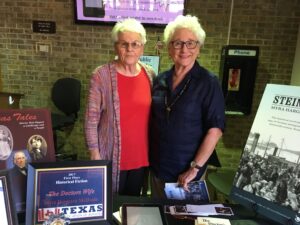
The Burnet County Historical Commission tells a tale that’s worth repeating. Ophelia Geraldine Crosby Harwood won the election for mayor of Marble Falls on April 2, 1917, three years before women received the right to vote. The all-male electorate gave her seventy-nine votes to defeat a popular local rancher’s thirty-three votes.
When she was born in 1872, the family claims a servant said she looked like a “pretty little blackbird.” From then on, Ophelia was called “Birdie.”
From her early days, she forged her own path. Known for her horseback riding skills, she claimed that she learned to ride before she could walk. And because she was sickly, the family believed she needed more sunshine. So, they tied her on a horse, gave her a bottle of water and a bag of food and she rode about for hours. With that start, it doesn’t seem surprising that while still in her teens she broke wild broncos.
In May 1892, Birdie married county doctor George A. Harwood and began her family. She said, “A woman’s first duty is to her home and children.” By the age of forty-five, Birdie had raised six children and decided she had a duty to public service. She mounted her horse and began her campaign for mayor of Marble Falls. She said she “ran for the office because wealthier citizens do not want the job, and a poor man cannot afford it. It is work that demands undivided attention and this is where a woman just fits. The men of Marble Falls have not been doing the job.”
She claimed her town had fallen ten years behind where it had been ten years before. “…it does look to me about time somebody was getting busy.” Like all politicians, she made promises to hold the line on the tax rate, but said she intended to make “two nickels grow where only one grew before.” She also pledged “to work for everything progressive, moral, spiritual and just. Don’t sell a woman short in the political arena.” Apparently, President Woodrow Wilson did not sell Birdie short because he endorsed her for mayor.
When Birdie took office, she declared “Clean-Up Day.” She said the books of the city would be open for inspection. Since her two-year term occurred during WWI, Birdie organized a chapter of the Red Cross and sponsored a fund-raising drive to provide clothing for European Jewish war refugees.
By August 1920, when the 19th amendment became law, many women had already served as mayors.
In 1934, Birdie’s husband Dr. George Harwood died. Two years later, she became the first woman to be named to the bench of the Marble Falls Municipal Court.
Possibly because she was known as the first woman to be elected mayor in Texas, Birdie began riding her coal black horse in parades around the state. She dressed in a flowing black riding habit and top hat and used a three-horn side saddle.
In 1938, Birdie rode her horse about 300 miles from Austin to Crosbyton. She broke up the trip in segments of thirty-five miles-a-day and won the title of Champion One-Way Rider at the West Texas Old Settler’s Convention. At times, Birdie traveled to parades by bus, carrying her sidesaddle with her. It is unclear how her horse got there.
Birdie married her childhood sweetheart, Robert Beverly, when they were both seventy-nine. She died in 1954 at the age of eighty-two.
On July 30, 1987, Paul Harvey featured Birdie in The Rest of the Story.

Wonderful role model and interesting tale!
Thanks, Eilene. I enjoyed telling her story.
I always enjoy your posts, Myra, and particularly when they involve strong, achieving women. My 7 novellas and one novel all feature such women.
Great! I’ll have to look for them.
great as always.
John Thorngren
Thanks, John.
What a woman was Birdie!
What a woman!
You do her justice, Myra.
Wonderful portrait.
Big hugs
john
Birdie had grit and I loved writing about her. Thanks, John.
Great story Myra. Thank Goodness there are and have been women like her.
I agree. Thanks, Beverly.